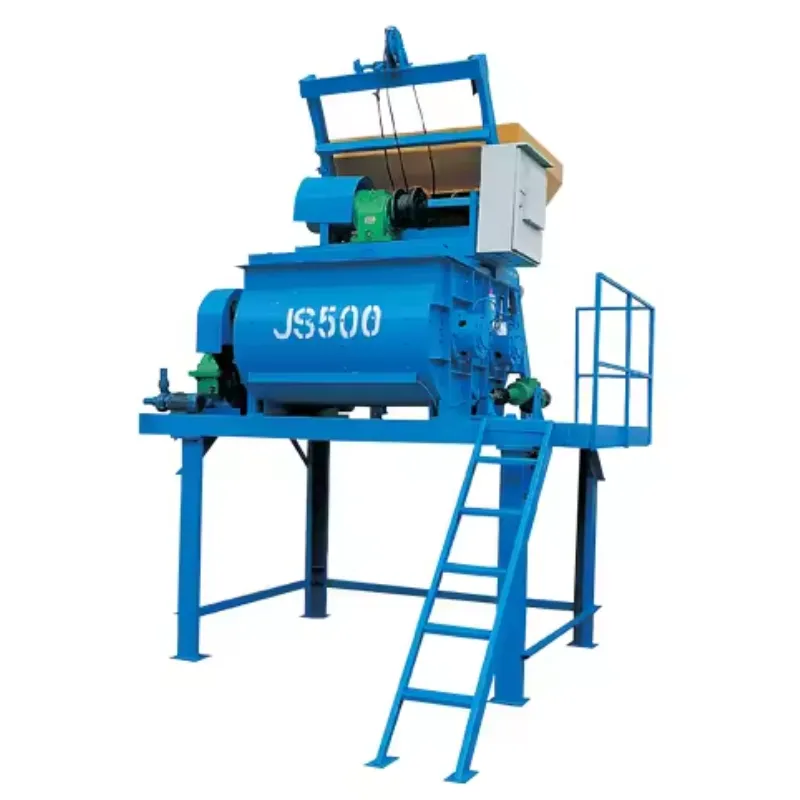How to Choose a Concrete Mixer
July 31, 2025
Whether you’re starting a construction project or expanding a block production line, selecting the right Concrete Mixing Machine is a crucial step toward efficiency, consistency, and long-term success. With so many models and configurations available, choosing a mixer can be overwhelming—especially when balancing budget, output needs, and production quality.
KBL Machinery, a leading provider of construction equipment and a trusted concrete block making machine supplier, offers expert insights into what makes a concrete mixer truly effective for your specific operation.

Understanding the Role of a Concrete Mixer
A Concrete Mixing Machine blends cement, aggregates, water, and additives into a uniform concrete mix. The right mixer ensures consistent quality, saves labor, and reduces material waste. Depending on your project scale, choosing between a portable mixer, a stationary unit, or a full-scale Concrete Mixing Plant will affect your productivity and cost control.
Inaccurate mixing or under-capacity equipment can lead to weak concrete, delayed timelines, and inconsistent batch results—issues that can be prevented with proper equipment selection.
Key Factors to Consider When Choosing a Concrete Mixer
Here are the essential elements to evaluate:
- Output capacity: Choose based on daily production requirements—too small wastes time; too large inflates costs unnecessarily.
- Mixing technology: Twin-shaft mixers offer higher mixing uniformity for large batches, while pan mixers are better for versatility and smaller jobs.
- Automation level: For integrated plants or block factories, automated control systems reduce labor and improve consistency.
- Durability: Ensure the machine is built with abrasion-resistant liners and heavy-duty steel components.
- Maintenance access: Well-designed mixers offer easy access to blades, motors, and hoppers for routine checks and repairs.
KBL Machinery’s mixers meet all these criteria, delivering high-performance systems tailored to real-world construction and block production needs.
The Connection Between Mixers and Block Making Quality
The quality of your concrete mix directly impacts the strength, finish, and durability of the final product—especially in automated block production. As a long-standing concrete block making machine supplier, KBL Machinery understands this link well.
Their concrete mixers are frequently integrated into full Concrete Mixing Plant setups that feed directly into block-forming systems. This seamless connection ensures that every batch meets required consistency and setting time—minimizing defects and rework.
Why Choose a Concrete Mixing Plant from KBL Machinery?
Beyond standalone mixers, KBL offers complete Concrete Mixing Plant systems for large-scale applications. These plants come equipped with aggregate batching, cement weighing, water dosing, and real-time control systems to support consistent, automated operations.
Benefits include:
- Higher batch volume, ideal for continuous production lines
- Fully automated control panel, allowing precise mix ratios and production tracking
- Integrated silos and conveyors, ensuring efficient raw material flow
- Compatibility with various molds and block machines from KBL’s product range
For companies seeking to scale production or supply ready-mix concrete, a mixing plant offers both operational efficiency and long-term reliability.
KBL Machinery: Full-Solution Support for Concrete Equipment
As a trusted concrete block making machine supplier, KBL doesn’t just sell machines—it provides solutions. From initial equipment consultation to on-site training and after-sales support, clients receive end-to-end service that ensures smooth integration and long-term value.
Their range of Concrete Mixing Machines is built to handle different types of aggregates, various environmental conditions, and continuous operation cycles. Whether you’re building houses, paving roads, or producing concrete blocks, KBL’s equipment adapts to your workflow and quality standards.


